The RX 7800 XT has a great price-to-performance ratio, unlike Nvidia’s RTX 4080, which packs as much power as possible without regard for the hole in the consumer’s wallet it will leave. This comparison will pin the RX 7800 XT vs RTX 4080 against each other to see if either approach holds any water against the other.
Key Takeaways
- There was a 45% performance advantage for the RTX 4080 in our gaming tests at 4k over the RX 7800 XT.
- The RTX 4080 only consumed 30 watts more power whilst performing much better.
- The RX 7800 XT is under half the price of the RTX 4080.
RX 7800 XT Vs RTX 4080
Comparison Table
| Technical Specs | NVIDIA RTX 4080 | Radeon RX 7800 XT |
| GPU | AD103 | Navi 32 |
| Architecture | Ada Lovelace | RDNA 3.0 |
| Process Size | 4nm | 5nm/6nm |
| Transistors | 45,900 million | – |
| Base Clock | 2205MHz | 1295MHz |
| Boost Clock | 2505MHz | 2430MHz |
| Streaming Processors | 9728 | 3,840 |
| Compute Units | 304 | 60 |
| RT Cores | 76 | 60 |
| TMUs | 304 | 240 |
| ROPs | 112 | 96 |
| Memory Size | 16GB | 16GB |
| Memory Type | GDDR6X | GDDR6 |
| Memory Bus | 256-bit | 256-bit |
| Memory Speed | 716.8 GB/s | 620 GB/s |
| L2 Cache | 64MB | 4MB |
| TDP | 320W | 263W |
| MSRP | $1199 | $499 |
| Best Variants | Best RTX 4080 | Best RX 7800 XT |
Architectural Differences
- Process Size: Nvidia uses cutting-edge 4nm processing nodes for its Ada Lovelace GPUs, whereas the RX 7800 XT employs a chiplet design that uses 5nm and 6nm processing nodes to keep costs down and efficiency up.
- Clock Speed: The RTX 4080 has a much higher base clock than the RX 7800 XT at around 2205MHz, versus the 1295MHz on the AMD card. The boost clocks are very similar, however, with the RTX 4080 hovering around 2505MHz at boost, whereas the RX 7800 XT comes just under this with a boost clock of 2430MHz.
- VRAM: Both cards have a 16GB VRAM buffer, but the RTX 4080’s memory is faster. It uses the GDDR6X video memory technology (as opposed to the GDDR6 of the RX 7800 XT), and it has a memory speed of 716GB/s, outclassing the 620GB/s memory speed of the RX 7800 XT. They both also share the same 256-bit memory bus.
- TDP: The RTX 4080 is rated to consume up to 320 watts of power, which is low for such a high-end card. The RX 7800 XT undercuts this further with a TDP of only 263 watts.
- Other Features: In terms of nice-to-have features, Nvidia takes the cake. It has better ray tracing, better-looking image upscaling, ray reconstruction, and frame generation.
Benchmarks
Now that the architectural details have been laid out before us, we can focus on the benchmarks of the RX 7800 XT vs RTX 4080. We will measure the performance of these cards in our test bench with the Ryzen 7 7800X3D and 32 gigabytes of RAM at its forefront to ensure a bottleneck-free experience in our testing.
The tests below were performed at the 4k resolution with close to Ultra settings in all games.
A Plague Tale Requiem
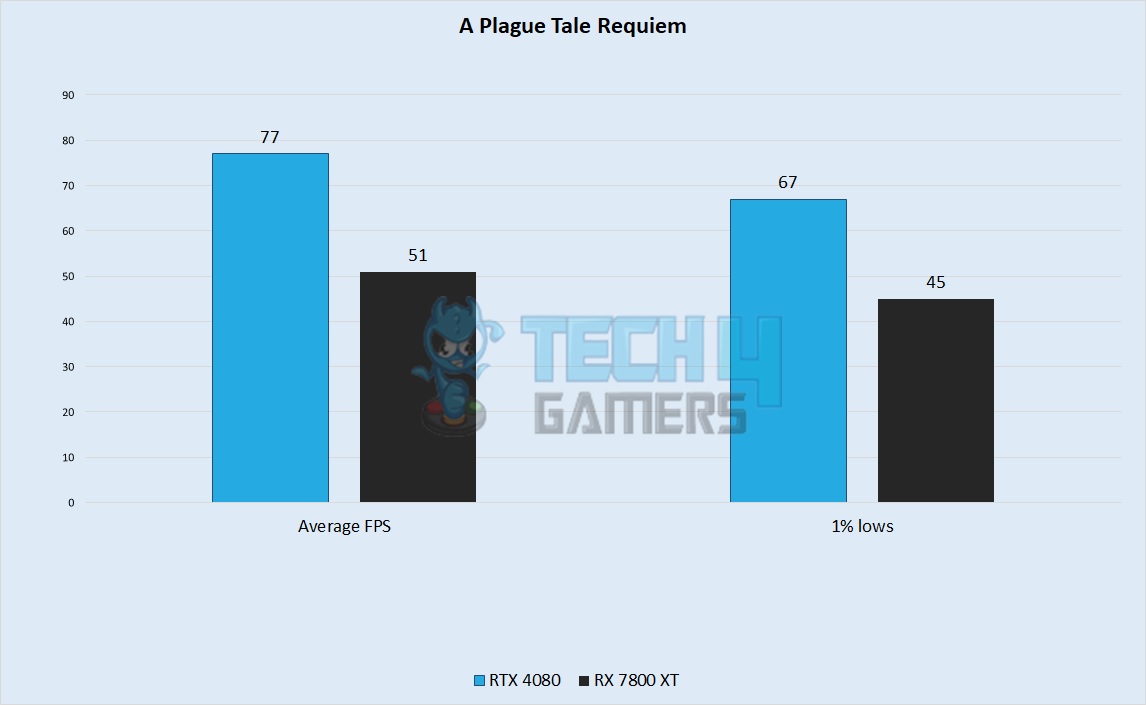
- Kicking things off with A Plague Tale Requiem, the RTX 4080 quickly eliminated any hope of this being a fair comparison with a 50% lead in average framerate. The RTX 4080 had a 77 FPS average, whereas the RX 7800 XT managed only to reach an average framerate of 51 FPS.
- 1% lows did not give us any hope for the Radeon card either, with the RX 7800 XT maintaining around 45 FPS. In contrast, the RTX 4080 was comfortably cruising over sixty framerates with a minimum framerate of 67 FPS.
Also Read: RTX 3090 Ti Vs RTX 4080
Resident Evil 4
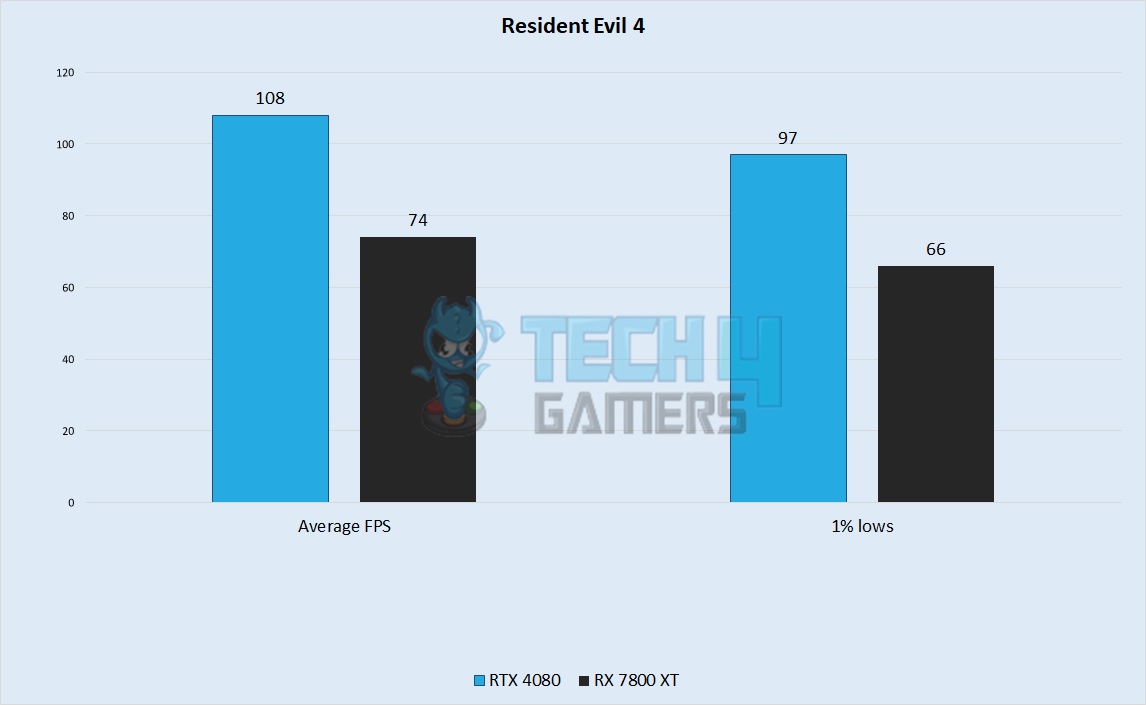
- The jumpscares of Resident Evil 4 could not prepare us for the performance difference between these two cards, with the RX 7800 XT getting an average framerate of 74 FPS, whereas the RTX 4080 managed an average of 108 FPS. This computed out to the RTX 4080 being 45% more performant in this game.
- 1% lows deviated similarly between the two cards as their average framerates, with the RX 7800 XT getting around 66 FPS, whereas the RTX 4080 stuttered down to around 97 FPS when there was a lot of action on-screen.
Also Check: RTX 4070 Vs RTX 4080
Cyberpunk 2077
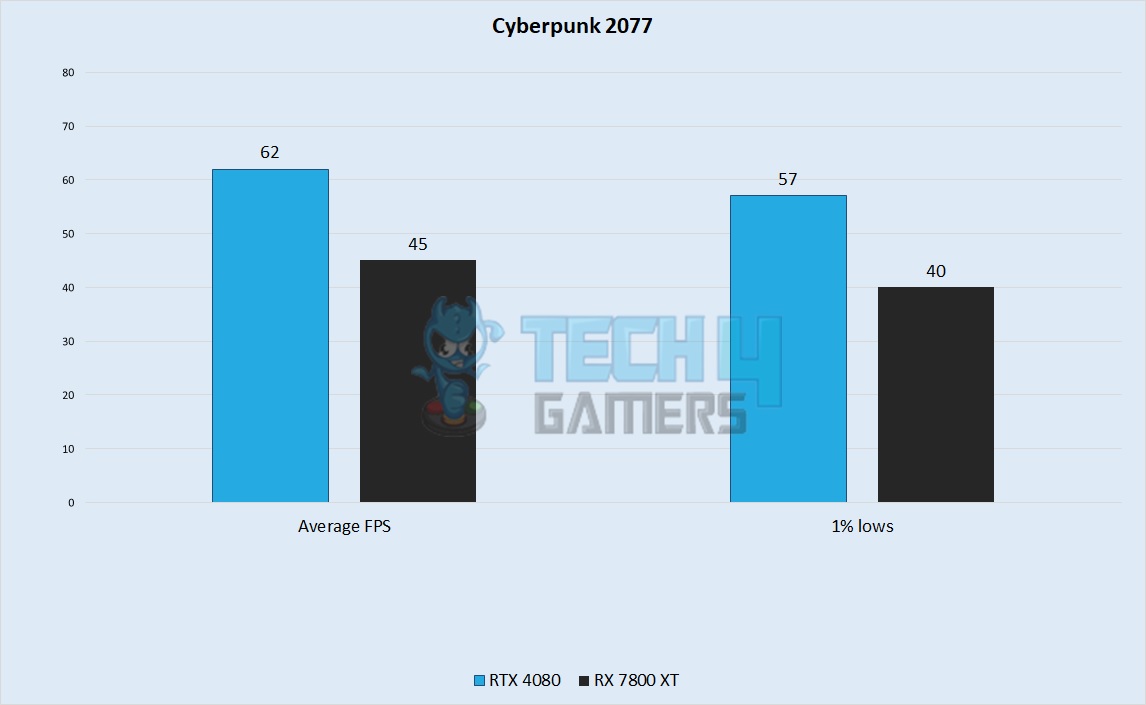
- With the high-quality preset and no use of ray tracing or upscaling, Cyberpunk 2077 proved to be quite a handful for both our graphics cards. The RX 7800 XT had an average framerate of 45 FPS, whereas the RTX 4080 had a framerate of around 62 FPS, meaning that the gap in performance was reduced to around 38% in this game.
- Despite the low average framerates of these cards, the 1% lows did not fall far from the tree. The RTX 4080 got down to 57 FPS when the intensity was dialed up, whereas the RX 7800 XT got down to around 40 FPS. Though neither of these framerates is ideal, they are not unplayable either.
Similar Guide: RTX 4080 Vs RTX 3090
Hogwarts Legacy
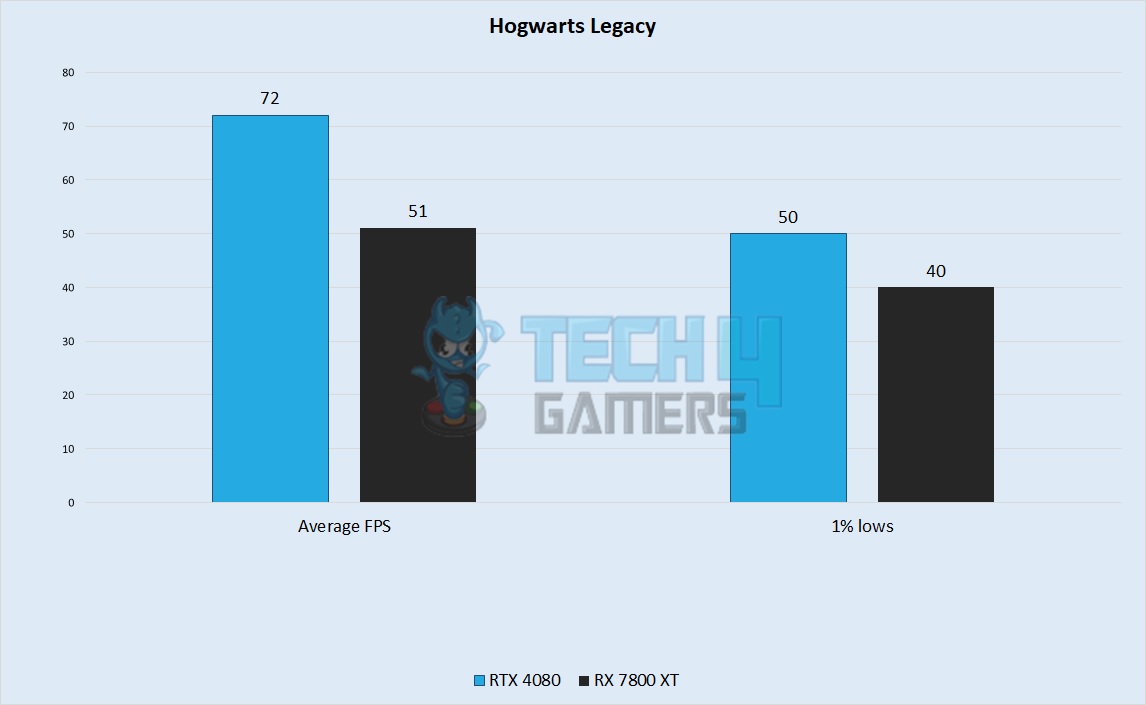
- The RTX 4080 regained its substantial lead in Hogwarts Legacy with an average framerate 41% higher than its competition. The RX 7800 XT managed to get an average of only 51 FPS at the Ultra preset, while the RTX 4080 had a much more comfortable average framerate of 72 FPS.
- Unlike the previous game, the 1% lows of the RTX 4080 took quite a hit compared to its average framerate. In graphically demanding scenes, the RTX 4080’s performance got bumped down to as low as 50 FPS. The RX 7800 XT was not immune to this either, getting a minimum framerate of around 40 FPS.
Also Read: RX 7900 XT vs RTX 4080
Forza Horizon 5
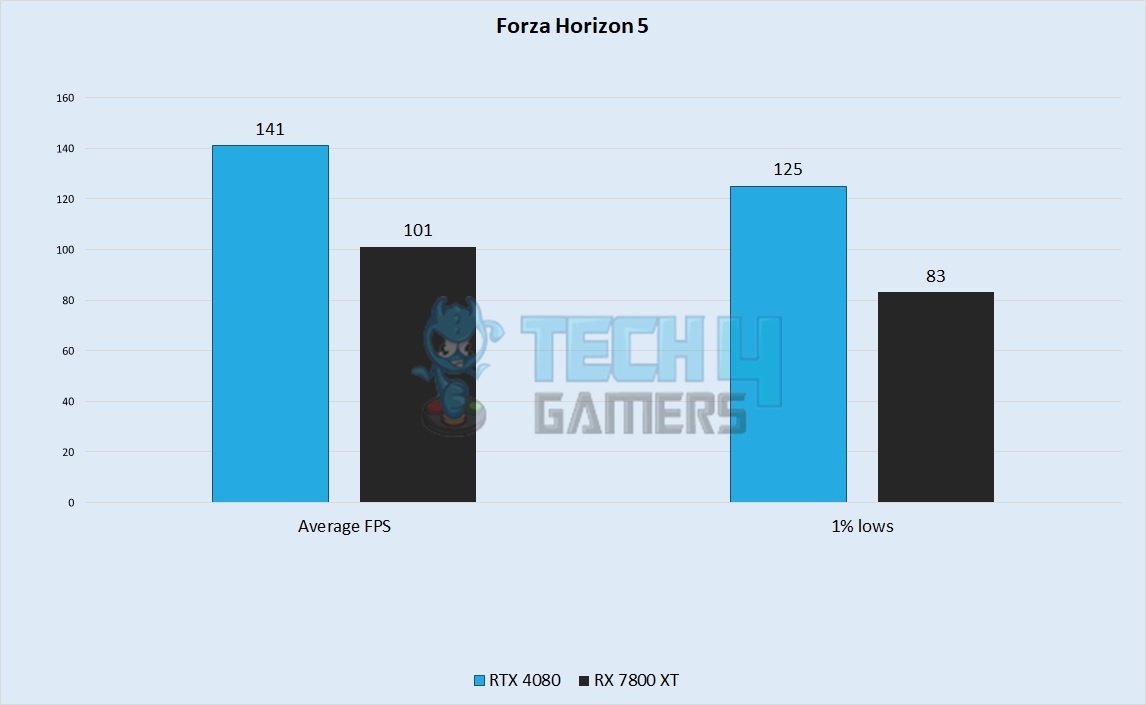
- Unsurprisingly, this game also had a pretty large 40% advantage for the RTX 4080, but both cards drove this game like a dream. The RTX 4080 had an average framerate of 141 FPS, whereas the RX 7800 XT was a much lower yet smooth 101 FPS average.
- The RTX 4080 did not experience large dips in performance, with the framerate dropping to 125 FPS at times, whereas the RX 7800 XT’s 1% lows felt more jarring, with the framerate dropping to around 83 FPS.
Similar Comparison: RTX 4080 vs RTX 4090
Marvel’s Spiderman Remastered
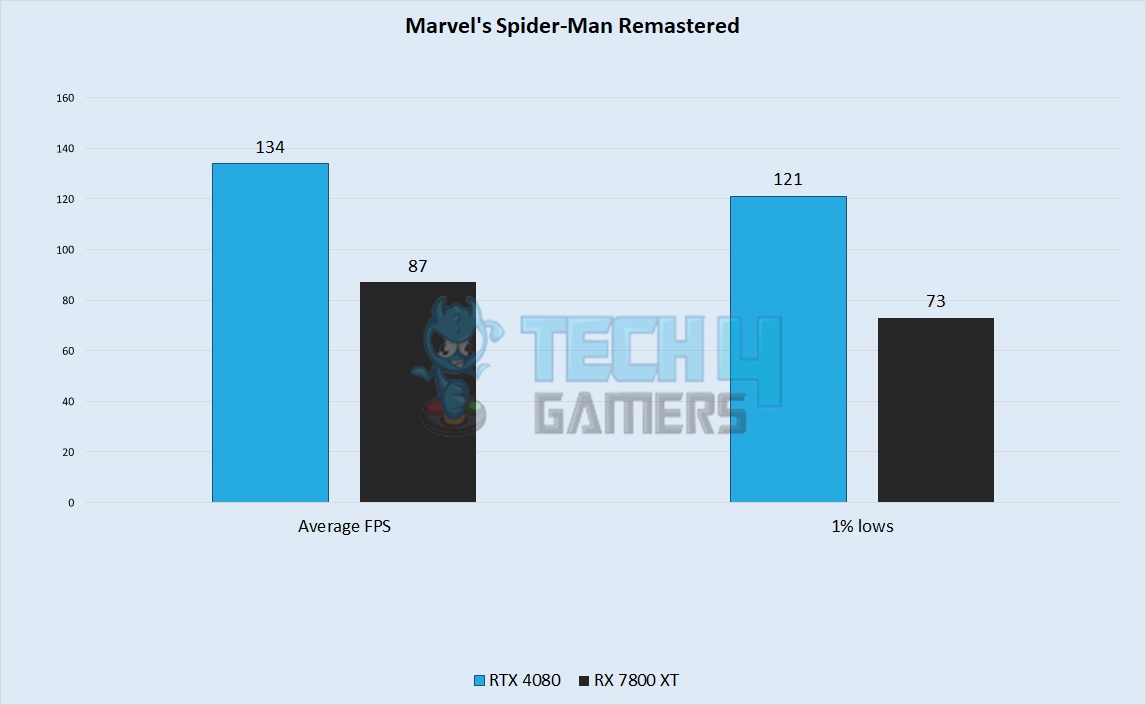
- The difference in performance between these two cards was shown very vividly in Marvel’s Spiderman Remastered, in which the RTX 4080 had a framerate around 54% higher than the RX 7800 XT. The former had a framerate of around 134 FPS on average, whereas the latter got around 87 FPS.
- 1% lows were not very bothersome in this game because of its great optimization. The RTX 4080 reached around 121 FPS when scenes got hard to render, whereas the RX 7800 XT dipped to 73 FPS when the same problem arose.
Also Read: RTX 4080 Vs RX 6900 XT
The Last Of Us
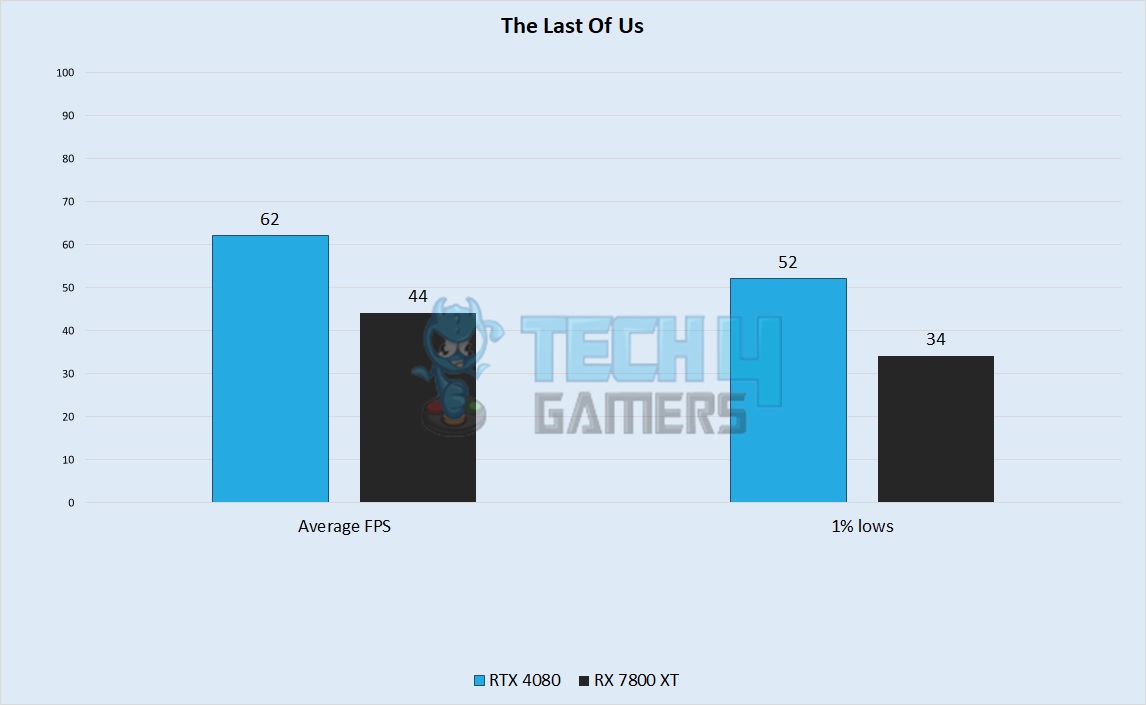
- Finally, for our last game, we tested The Last Of Us with the settings all the way up. With no VRAM bugs because of the memory requirements of this game, the RTX 4080 got around 62 FPS, whereas the RX 7800 XT hovered around 44 FPS. This difference is around 41%.
- 1% lows dropped ten frames from the average of both cards, with the RTX 4080 getting lows of 52 FPS, whereas the RX 7800 XT got around 34 FPS.
Similar Guide: Nvidia RTX 4080 Vs RTX 3080 Ti
Overall Gaming Performance
Listing the framerates in individual games can feel like a bombardment of numbers to the average consumer, so we will take a step back to compare the RX 7800 XT vs RTX 4080 in broader terms in the section below.
Framerate
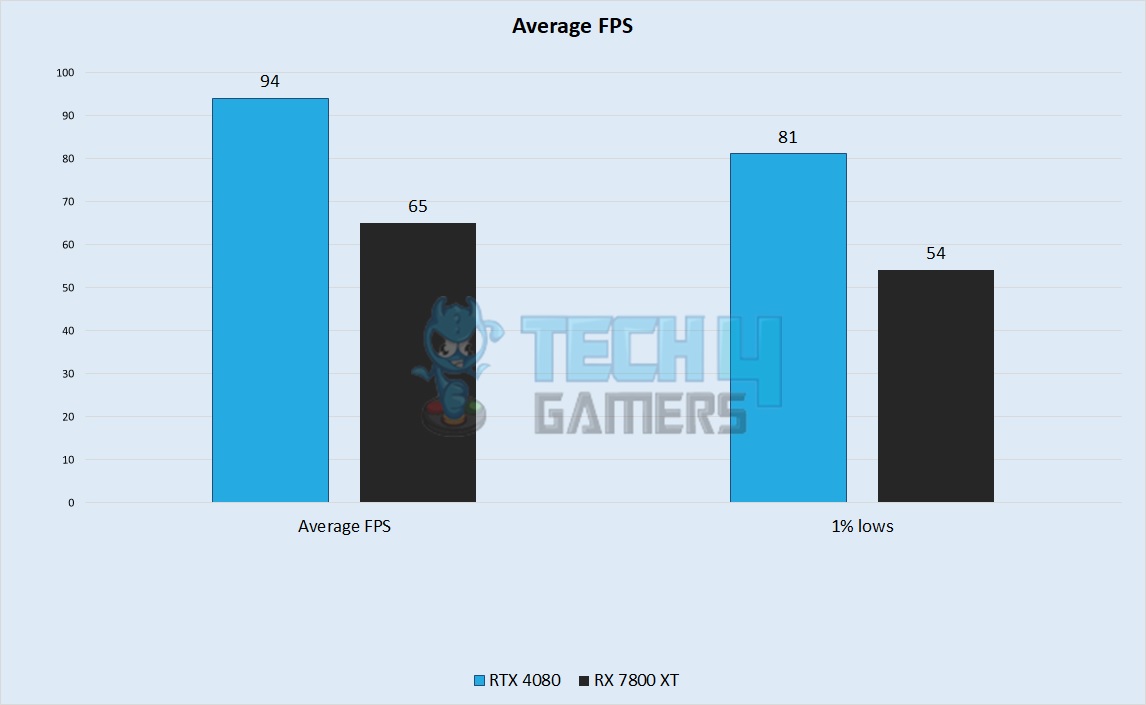
- Our gaming tests at 4k showed the RTX 4080 to be around 45% faster than the RX 7800 XT in terms of average framerates. Over seven games, the RX 7800 XT had an average framerate of around 65 FPS, whereas the RTX 4080 had an average framerate of 94 FPS.
- As expected, the 1% lows were lower than the average but with the same difference ratio. The RTX 4080 lowered its framerate to around 81 FPS in action-heavy scenes on average, whereas the RX 7800 XT plummeted to around 54 FPS when rendering got tough.
- Both cards could use their respective upscalers to get a 30-40% performance boost without noticeable degradation in visual quality. Nvidia’s DLSS is generally thought of as looking better. In contrast, AMD’s FSR can be integrated on a driver level, meaning we can still take full advantage of this feature even if a game does not support it in its settings.
- Though AMD’s upscaler is more accessible in games, Nvidia also hides a trick under its sleeve. DLSS 3 brings frame generation to the RTX 40 series of cards. It can add interpolated frames in between rendered frames to give the game a smooth experience without making your card work noticeably harder.
- As with upscaling, Nvidia also beats the RX 7800 XT in terms of ray tracing as the RT cores on the RTX 4080 are more mature, more abundant, and also come with software optimizations like ray reconstruction to improve visual fidelity and performance.
Also Read: RTX 4080 Vs RTX 3080
Power Consumption
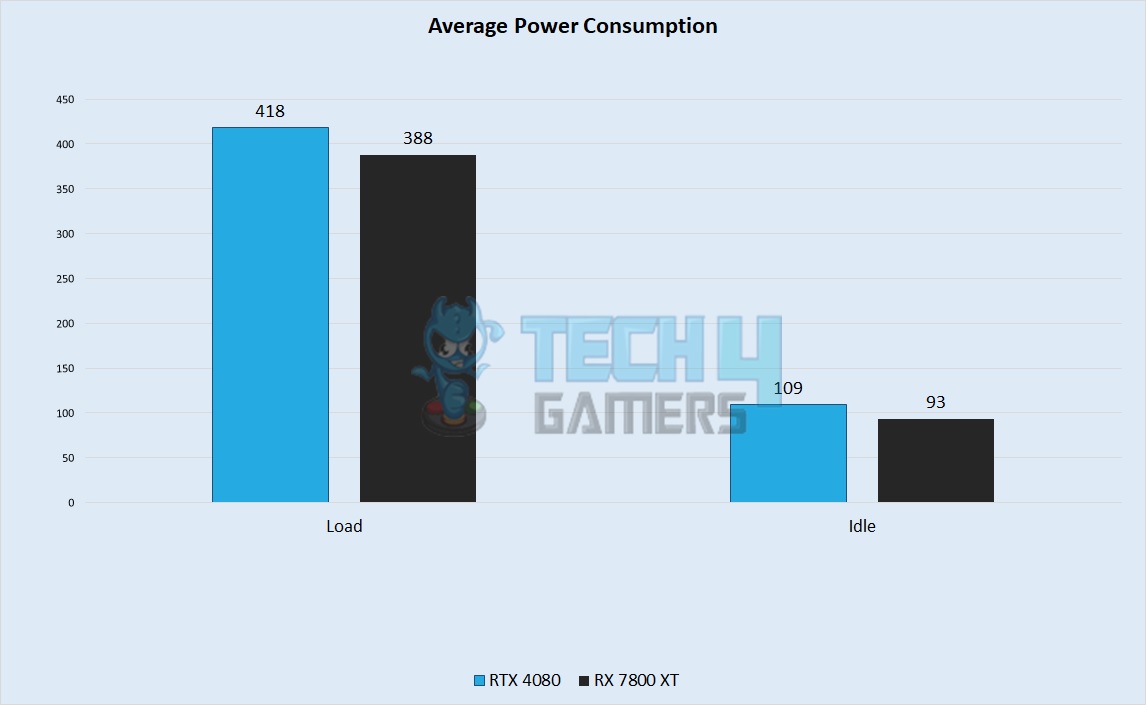
- Though the difference in performance between the two cards is vast, the power consumption is relatively similar. This speaks volumes about how Nvidia has made it their goal for this generation to give as much performance as possible with the least amount of power consumption possible.
- Our test bench had a system power consumption of around 418 watts under load with the RTX 4080 and around 109 watts when the system was idle. This power draw is impressively low, considering the high-end component used in our test bench.
- The RX 7800 XT was not that far behind in terms of power consumption, using up around 388 watts of power when under load, whereas the idle power draw hovered around 93 watts.
- Considering our average framerates and power consumption under load, the RTX 4080 has a performance-per-watt of around 0.22 frames/watt. In contrast, the RX 7800 XT had a performance-per-watt of around 0.17 frames/watt, which is around 33% lower than the RTX card.
- The power consumption of these cards relies quite heavily on their coolers and the extent of overclocking, so you might find that your card draws a different amount of power than what we report in our tests using the Founder’s Edition RTX 4080 and the Coolermaster Hellhound RX 7800 XT.
Similar Guide: RTX 4080 Vs RX 6950 XT
Price And Availability
- The RX 7800 XT has a launch MSRP of $499, whereas the RTX 4080 is in a completely different stratosphere, with the cheapest RTX 4080 variant on Newegg going for around $1099.
- If we compare the price-to-performance ratio of the two cards, the RX 7800 XT is over 51% better than the RTX 4080 (using the average framerates from our testing.)
- Both cards are readily available at any large computer parts retailer around the globe, as well as eCommerce websites like Newegg and Amazon.
RTX 4080 Vs RX 7800 XT: Which One Should You Go For?
The results of our tests show these cards appeal to very different users. In this part of our analytic comparison between these cards, we will list the benefits of the RX 7800 XT vs RTX 4080 to clarify the use case of either card.
- Undoubtedly, the RTX 4080 is the better performer of the bunch. It consistently outclassed its competition by around 45% in our testing, making it a great card for anyone looking for a high refresh rate 4k gaming experience.
- Having said that, the RX 7800 XT is no slouch either. Sure, the RTX card gets you 45% more performance, but it’s not worth the 120% price increase for most people. The performance of the RX 7800 XT is adequate to play any modern title at 4k comfortably, albeit with the use of some FSR. This makes the 7800 XT a great option for anyone looking for a capable card on a budget.
- The power draw of the RX 7800 XT was around 30 watts lower than the RTX 4080, which is not a large enough difference to base your purchasing decision on.
- Nvidia justifies the price increase of the RTX 4080 because of its new frame generation technology that can dramatically improve your performance without driving your hardware harder. This means the already large 45% lead the RTX 4080 has over the RX 7800 XT can skyrocket if you use DLSS 3 frame generation.
- Though AMD’s equivalent of frame generation is not out yet, it will be released in the first quarter of 2024 to bring some equivalence to the pecking order between these two cards.
- To summarize, the RTX 4080 is a card for someone looking for no compromises, whereas the RX 7800 XT is one of the best graphics card deals of the new generation.
Pros And Cons
| GPU | Pros | Cons |
| GeForce RTX 4080 |
|
|
| Radeon RX 7800 XT |
|
|
Frequently Asked Questions
AMD has announced their competitor to Nvidia’s generation named Fluid Motion Frames. It will be available to all GPUs (AMD and Nvidia) and will be released around Q1 2024.
The RX 7800 XT was released 10 months after the RTX 4080, but both graphics cards are part of the same generation.
The higher VRAM requirements of modern games might seem like it’s going exponentially, but it’ll take quite a while for the minimum requirement to double.
Thank you! Please share your positive feedback. 🔋
How could we improve this post? Please Help us. 😔
[Wiki Editor]
Ali Rashid Khan is an avid gamer, hardware enthusiast, photographer, and devoted litterateur with a period of experience spanning more than 14 years. Sporting a specialization with regards to the latest tech in flagship phones, gaming laptops, and top-of-the-line PCs, Ali is known for consistently presenting the most detailed objective perspective on all types of gaming products, ranging from the Best Motherboards, CPU Coolers, RAM kits, GPUs, and PSUs amongst numerous other peripherals. When he’s not busy writing, you’ll find Ali meddling with mechanical keyboards, indulging in vehicular racing, or professionally competing worldwide with fellow mind-sport athletes in Scrabble at an international level. Currently speaking, Ali has completed his A-Level GCEs with plans to go into either Allopathic Medicine or Business Studies, or who knows, perhaps a full-time dedicated technological journalist.


![Ryzen 5 7500F Vs Ryzen 5 5600X: [Gaming Benchmarks] Ryzen 5 7500F Vs Ryzen 5 5600X](https://tech4gamers.com/wp-content/uploads/2023/08/Ryzen-5-7500F-Vs-Ryzen-5-5600X-218x150.jpg)

![RX 5700 XT Vs RTX 3060 [Gaming Benchmarks 2023] Radeon RX 5700 XT vs GeForce RTX 3060](https://tech4gamers.com/wp-content/uploads/2023/02/Featured-Image-Radeon-RX-5700-XT-vs-GeForce-RTX-3060-218x150.jpg)
![ARC A750 Vs RTX 3060 [Gaming Benchmarks 2023] Arc A750 Vs RTX 3060](https://tech4gamers.com/wp-content/uploads/2023/06/Arc-A750-Vs-RTX-3060-218x150.jpg)

